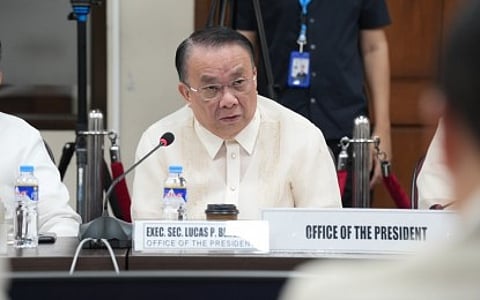
- NEWS
- the EDIT
- COMMENTARY
- BUSINESS
- LIFE
- SHOW
- ACTION
- GLOBAL GOALS
- SNAPS
- DYARYO TIRADA
- MORE

Executive Secretary Lucas Bersamin yesterday defended the 2025 national budget amid criticisms from the Catholic clergy, which called it “ayuda” or aid-driven.
On Sunday, the clergy of the Catholic Church called on the Catholic faithful to become “lights of hope” by rejecting the 2025 national budget, as it is filled with billions of pesos for financial assistance, which “breeds corruption and patronage politics, especially in the upcoming midterm elections.”
It also urged the government to “transition” from a budget that focuses on financial assistance to empowering people through various social projects and programs instead.
Bersamin noted that President Ferdinand Marcos Jr. directly vetoed the largest amount of appropriations in history. “No president before him had ever so deeply and comprehensively purged the budget of unnecessary items,” he said.
He added that the Chief Executive redirected billions from the budget to fund social projects and programs “that create social good, spur progress, and serve the welfare of the people.”
He stressed that with the thorough review of the administration’s economic team, the budget now has stricter conditionalities for budget releases, ensuring that it is aligned with national priorities and protected from partisan interests.
“Having undergone adjustments permitted by law, the funds will be released transparently and in accordance with good governance principles and laws,” he said.
“All of this stems from the recognition that financing the budget is shouldered by the people; therefore, its implementation must honor the sacrifices they have made,” he added.
The Catholic clergy is the latest group to air its concerns on the implementation of the budget.
In a pastoral letter issued by the Catholic Bishops’ Conference of the Philippines, the organization also called out the “scandalous misuse of public funds and resources; the questionable insertions, cuts, and adjustments in the national budget.”
CBCP president and Kalookan Bishop Cardinal Pablo Virgilio David said that the anti-poverty programs of the government are “disturbing” and “promote a culture of patronage and mendicancy.”
Marcos signed the General Appropriations Act into law on 30 December 2025 after vetoing over 194 billion of pesos worth of line items that are “inconsistent with the administration’s priorities.”
In January, Marcos led several meetings with heads of national government agencies to discuss the implementation of the budget within their departments and address pressing concerns.
Amid the controversy, allegations have emerged regarding “blank pages” in the congressional bicameral conference committee report, raising concerns over transparency in the final version of the budget.
Lawmakers critical of the administration claimed that the supposed blank pages allow for post-ratification insertions, which could facilitate discretionary spending without congressional oversight.
However, budget officials have dismissed these allegations, insisting that the document follows standard legislative procedures.
President Marcos himself said he did not see any of those blank pages when he chopped off portions of the budget bill.
Senate and House leadership have pledged to investigate the matter.
